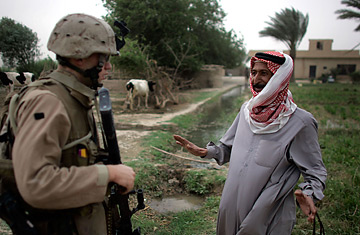
U.S. Marine Sergeant Matt Lyons from Chatham, Illinois, talks with a villager as he conducts a security patrol May 12, 2007 in the area known as Zaidon in the Al Anbar province.
The new mission for Marines like Vistek is to act less as warriors and more as policemen and goodwill ambassadors. In al Qaim, a community of farmers and merchants along Iraq's border with Syria, the Marines have been employing a classic counter-insurgency strategy since the end of 2005. The emphasis here has shifted from hunting down and destroying the enemy to providing security in al Qaim's cities and villages. Capt. Luke Gové, Vistek's company commander, said the Marines are the best-trained and best-equipped force in the area. He asks rhetorically, "Are we the best force to conduct a counter-insurgency? Absolutely not." But they bear much of the burden while they train Iraqi soldiers and police to take their place.
Marines here speak of "strategic corporals." In a fight where public perception is so vital the decisions made by young enlisted men don't just affect a particular patrol, or the opinions of Iraqis on a single street. The ripple effect can change the strategic picture of an entire region dramatically. "The complexity of what we're doing is so much greater," Gové said. The key choice is often when to "not act — which is the hardest thing for a Marine to do." One cultural lesson the Marines have learned is that what appears to American eyes to be corruption — bribes paid, money skimmed off the top of construction projects — is simply standard operating procedure in an area dominated by family connections and tribal networks. "People get it wrapped around the axle because these guys aren't exactly Jack Webb types: 'Just the facts,'" said Gové. "They may be taking something on the side." But the goal is to create functioning security forces that are accepted by residents here, not to create a force that meets American standards of ethics and transparency.
For Vistek the new approach has meant "a lot of responsibility that the pay grade has never really had before." In al Qaim, he says Marines are now tasked with such community outreach at the rank-and-file level and with every contact with Iraqi civilians. Says Vistek: "The responsibility went from, 'oh, that's on the [lieutenant]' to, 'Holy s---, my [unit's] responsible for three patrols a day? Wow.'" That new function combined with the old but still necessary task of fighting insurgents can be overwhelming. Gove, like other Marine commanders in al Qaim, is mindful that he risks pushing his men past their limits as he attempts to blanket the area with American troops. "You can't burn these guys out," says Gové. "On the other hand, you can't leave a section of town uncovered — because wherever we aren't, that's where [the insurgents] are."
As in the rest of Iraq, the hope in Qaim is that the American burden will lessen as Iraqi security forces take the lead. In Baghdad and other centers of sectarian violence, where the security forces are riddled with militiamen and where Shi'ites patrol hostile Sunni neighborhoods, that hope is more like a fantasy. But in al Qaim, foreign jihadists not too long ago antagonized local Sunni tribal leaders; and now the Americans have used that local history to win cooperation from the same maligned tribes, recruiting personnel for the Iraqi army and police. "It's in our best interest to train them and trust them," Vistek says. "We've got their back whether they know it or not. We just hope that they'll return the favor."
